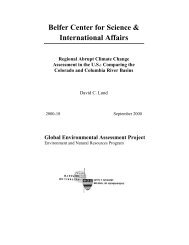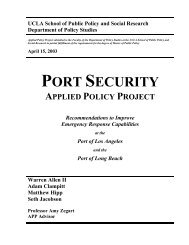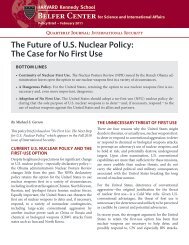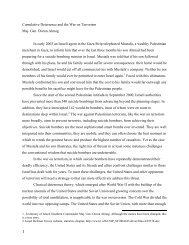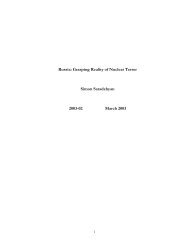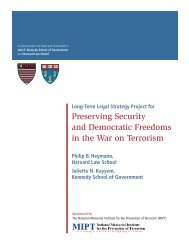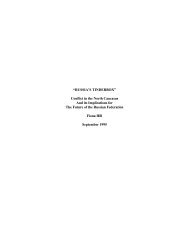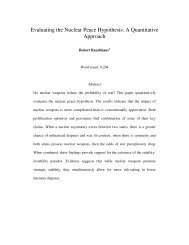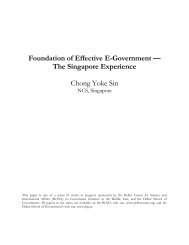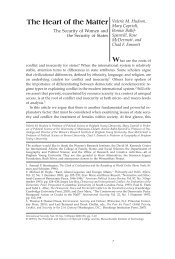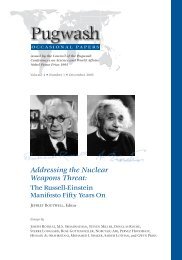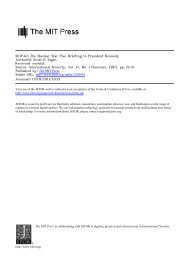Disrupting Escalation Of Terror In Russia To Prevent - Belfer Center ...
Disrupting Escalation Of Terror In Russia To Prevent - Belfer Center ...
Disrupting Escalation Of Terror In Russia To Prevent - Belfer Center ...
Create successful ePaper yourself
Turn your PDF publications into a flip-book with our unique Google optimized e-Paper software.
<strong>Russia</strong> responded to this incursion with force, and the ensuing war was immediately<br />
framed by the Islamist wing of the Chechen-based religious extremists as a crackdown on true<br />
believers, while their struggle was depicted as jihad. 27 <strong>To</strong> date, these extremists continue to fight<br />
and use Islam to legitimize their actions and to frame their struggle as part of the worldwide<br />
jihad. 28<br />
When Wahhabism and other forms of militant salafism took root in Chechnya in the mid-<br />
1990s, it became a training ground for jihadists from all over the world. “Students” from Central<br />
Asia, the Caucasus, and the Volga region, as well as citizens of Saudi Arabia, Jordan, China,<br />
Pakistan, and Malaysia learned explosive techniques, guerilla warfare and Wahhabi theory at<br />
camps run by Khattab and other warlords in Chechnya. 29 Alumni of Chechnya’s training camps<br />
have become the core of the extended anti-<strong>Russia</strong>n terrorist networks of “Wahhabis” 30 in<br />
27 See Basayev’s numerous statements on the rebel website Kavkazcenter.com.<br />
28 Reacting to this shift, the U.S. Department of State designated three Chechen rebel groups—Islamic <strong>In</strong>ternational<br />
Brigade, Special Purpose Islamic Regiment, and Riyadus-Salikhin Reconnaissance and Sabotage Battalion of<br />
Chechen Martyrs—as foreign terrorist organizations in February 2003. The Chechen rebels’ jihad doctrine is<br />
represented by judgments of the major ideologue of violent jihad and the mentor of Osama bin Laden, Palestinian<br />
Sheikh Abdullah Azzam, taken out of his work Defense of the Muslim Lands, and of a Muslim theologian Ibn<br />
Taymiyya (1263–1328), a favorite theorist of radical Muslims. Both encourage the participation of women and<br />
children in the fighting.<br />
Operatives of another al-Qaida-linked network, the Islamic Movement of Uzbekistan, have been spotted in<br />
<strong>Russia</strong>. Three IMU members suspected in a March attack in Uzbekistan that killed forty-seven people were arrested<br />
in May and June of 2004 in <strong>Russia</strong>’s Muslim-populated Volga regions.<br />
Compared to other neighboring ethnic groups preaching Islam, the Chechens have not developed a<br />
indigenous school of religious thought and have retained many ancient animist traditions and beliefs. The extremely<br />
formalized and de-spiritualized Wahhabism that perceives jihad as external warfare (contrary to the Northern<br />
Caucasus’ traditional sufi Islam, that views jihad as a struggle of a Muslim with his own vicious impulses) quickly<br />
took root among the Chechen youth, who saw it as a revolutionary and “purifying” doctrine.<br />
<strong>In</strong>side Chechen terror networks, the preaching of mullahs defines the rebels’ modus operandi, since both<br />
sources of religious and operational authority coincide in their leadership, called the Majlis-ul Shura (People’s<br />
Council). The Shura unites warlords, Wahhabi scholars, and the Chechen rebels’ few foreign envoys. Any criticism<br />
from religious authorities from outside the rebels’ cause is repelled by the Shura, which denies their legitimacy<br />
because of their siding with Moscow.<br />
29 Gennady Troshev, “Emir Khattab: Shtrihi k Portretu,” Krasnaya Zvezda, April 27, 2002.<br />
30 Islamist radicals are commonly, but incorrectly, referred to in <strong>Russia</strong> as Wahhabis. Not all those that <strong>Russia</strong>n<br />
officials and media brand as Wahhabis are followers of cleric Al Wahhab and his teachings, and not all of those who<br />
are indeed Wahhabis are preaching or practicing violence. It would be more appropriate to describe such Islamist<br />
fighters, who seek to establish an Islamist state that would include all Muslim republics of the North Caucasus as<br />
militant salafites. Salafites are Islamists who stand for Salafiya, which means “pure Islam.” Many ascribing to<br />
Salafites support radical actions in search of pure Islam. Again, we should note that not all Salafites in the North<br />
Caucasus are militant and ready to use force in order to establish an Islamist state. For instance, only 1,000 out of<br />
11



